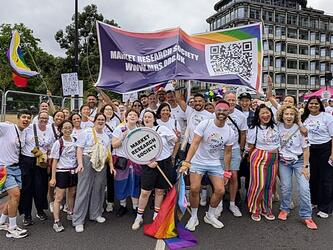What’s not to like? Why companies should sign the MRS inclusion pledge

The MRS inclusion pledge was launched in 2018 with the explicit goal of driving greater equality within the research and insights sector. The ambition was clear:
“We believe that a sector that provides insight and evidence about human behaviour and society should be representative of the world it serves. We are committed to creating an inclusive environment where the only barriers to progress are personal choice and professional competence.” (MRS 2018 )
Sounds like common sense to me – believing that people who work in the insight and research sector should be treated equally and fairly. What’s not to like about that?
The inclusion pledge commitments
Some have said that the term ‘pledge’ carries the weight of something arduous; never a good thing in our time-challenged world. Having six ‘commitments’ surely doesn’t offer much hope to the contrary! But let’s have a look at these before passing judgement. Each of the commitments is summarised below:
- Gather, and where appropriate, publish pay statistics annually.
- Work towards diversity that reflects the wider location, end unpaid internships and consider apprenticeships as a recruitment tool.
- Work towards meeting government targets for the employment of women and people from minority ethnic groups at senior management and board level.
- Design and conduct research projects that enable true representation.
- Improve the representation through better recruitment practices.
- Create safe and welcoming places in which all people can work. This requires building a culture where ‘whistle blowing’ can exist and where staff are trained to better manager issues such as mental well-being.
What’s not to like?
When reading through each of the above, the following adjectives immediately sprung to my mind: benign, sensible, obvious, necessary, basic, foundational and progressive. They are hardly the basis for a neo-communist manifesto, or am I missing something? There is very little, at least from my perspective, that would lead someone to accuse the MRS, as was the case recently, of leading a ‘diversity cult’. Strong words for such seemingly innocent intent.
So, what is it, then, that can make organisations in our sector uneasy? Why is it, then, that not every company has signed the inclusion pledge (although over 100 have done)? Where, precisely, does the problem lie? Lack of awareness?
Lack of understanding as to what the inclusion pledge really means may be an issue. Both awareness and understanding are potential issues the MRS is aware of and that are being tackled (although there is a very clear outline and detail on the MRS website). The fact that the industry is going through financially challenging times may be another reason. Things aren’t easy; but the cost of signing the inclusion pledge is relatively small, and tiny in relation to the potential benefits for staff and businesses alike.
It may also be, although I sincerely hope not, that there are now ‘shinier’ things to focus on, such as AI. Don’t get me wrong, AI is fascinating, potentially transformational, but will it create working environments where people are happy, feel valued and create a positive culture of respect?
The journey to something better
Maybe there is a sense that if you sign the inclusion pledge you will be under intense scrutiny? Or that signing will be prohibitive in terms of time, focus and money? Nothing could be further from the truth. Signing the Inclusion Pledge is a commitment to begin a journey of human development and experience. As one signatory told me recently: “It’s the start of a journey; you sign and you aim to get better. It’s a process of learning and challenging yourself.”
There is no single start-point. No iron fist landing in judgement. No shaming of those further behind than others. Signing the pledge means joining a community of organisations that want to become better. Signing the pledge is a commitment to becoming a better place for all staff. At the risk of repeating myself, what’s not to like?
#SignthePledge
I have a favour to ask. Find out if your organisation has signed the inclusion pledge – you may need to pin your CEO down (they are often the signatories). If you are part of the pledge community, ask your leadership what the plans are for moving things forward. What route is your organisation’s journey taking? There should always be a forward plan. We should always be in the process of becoming better.
For those of you who find out that your organisation hasn’t signed, please ask those responsible ‘why’? What is that about equality, fairness and a better work-life for all that is felt to be insufficient as a motivator?
For any clients reading this, ‘just say no’ to any agency that hasn’t signed the inclusion pledge. I’m sure future assessments will show that signing raises human happiness and creates more intelligent and productive environments. These, in turn, mean even more stunning and empowering debriefs. What’s not to like?
Mark Thorpe is board director at Truth

We hope you enjoyed this article.
Research Live is published by MRS.
The Market Research Society (MRS) exists to promote and protect the research sector, showcasing how research delivers impact for businesses and government.
Members of MRS enjoy many benefits including tailoured policy guidance, discounts on training and conferences, and access to member-only content.
For example, there's an archive of winning case studies from over a decade of MRS Awards.
Find out more about the benefits of joining MRS here.














0 Comments